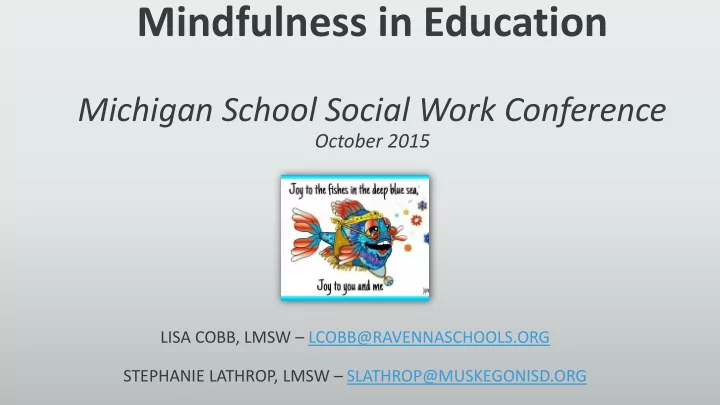

Mindfulness in Education Michigan School Social Work Conference October 2015 LISA COBB, LMSW – LCOBB@RAVENNASCHOOLS.ORG STEPHANIE LATHROP, LMSW – SLATHROP@MUSKEGONISD.ORG
Today’s Mindful Agenda o Introductions and Ice Breaker o Perception o Mindfulness Principles o Mindfulness Practice o Mindfulness Power o Closing Activities o Wrap-up and Debriefing
o Emotional stressors o Family stressors Stress…everyone has it… o Social stressors o Change stressors o Chemical stressors o Work stressors o Decision stressors o Phobic stressors o Physical stressors o Disease stressors o Pain stressors o Environmental stressors
Research Supports Mindfulness Practices o Increased emotional regulation o Decreased ADHD behaviors — specifically o Increased self-calming hyperactivity and impulsivity o Increased social skills and social o Fewer conduct and anger management compliance problems o Increased care for others o Decreased negative affect, or emotions o Increased sense of calmness, relaxation, and self-acceptance o Decreased anxiety in general and text anxiety in o Increased self-esteem particular o Increased quality of sleep o Decreased depression o Increased attention o Increased executive function (working memory, planning, organization, and impulse control)
Choice-making Tools for Success o Change the Situation o Change our Perception o Accept the Situation The ability to claim and make choices is directly related to personal ownership, respect and self-worth
Options for Change
Mindfulness Paying attention in a particular way o On purpose o In the present moment o Without judgment Jon Kabat-Zinn - Founder: Mindfulness-Based Stress Reduction (MBSR) University of Massachusetts Medical Center
Respond Versus React
Mindfulness Mindfulschools.org
Mindfulness o Our thoughts and perceptions, if negative, reinforce emotions that can cause suffering o Thoughts are most often about the past or future o The one moment we actually can experience “the present moment” is the one we seem most to avoid
Educational “Standards” o For students to successfully meet “Standards”, they must possess social-emotional skills o Unless students come to school with all these skills in place, deliberate teaching of these skills is necessary
Mindfulness Practice: Tier 1, 2 and 3 Intervention
Mindfulness can help us negotiate the complexity of life …at any age!!!!
With Mindfulness o WE can LAUGH at ourselves more o WE can be LESS CRITICAL of ourselves and others o WE are KINDER o WE are more SINCERE
Recommend
More recommend